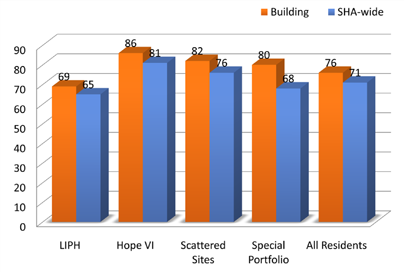 SEATTLE — April 14, 2011 — Results from a recent survey of residents in the Low-Income Public Housing program indicate that an overwhelming 76 percent of residents surveyed support a no-smoking policy in their building, while 71 percent support a no-smoking policy throughout all Seattle Housing communities.
SEATTLE — April 14, 2011 — Results from a recent survey of residents in the Low-Income Public Housing program indicate that an overwhelming 76 percent of residents surveyed support a no-smoking policy in their building, while 71 percent support a no-smoking policy throughout all Seattle Housing communities.
The survey, sent to residents in January and February of this year, was meant to assess smoking behaviors and practices, measure support for smoke-free housing, and determine interest in tobacco cessation tools. The agency received 1,804 responses to the survey, a response rate of 33 percent.
“We now see that there is significant support for a no-smoking policy among residents. We will move forward to consider various policy options, consult with residents, and return to the board with suggestions in a few months,” said Executive Director Tom Tierney.
Last fall, the Seattle Housing Authority was awarded the Communities Putting Prevention to Work (CPPW) grant, funded by Public Health Seattle and King County, to examine how Seattle Housing can implement policy, systems, or environmental changes to protect our residents from the hazards of tobacco smoke.
A strong majority of respondents recognized the health hazards of secondhand smoke, with 78 percent declaring it very harmful and 18 percent considering it somewhat harmful. A mere 2 percent stated secondhand smoke was not harmful to human health.
Seventeen percent of respondents smoke and, of those, 37 percent were interested in cessation resources, 27 percent already have rules about not smoking in their homes, and 25 percent support a no-smoking policy. Almost half, or 45 percent of respondents, have experienced smoke drift in their home either from a neighboring unit or from outside and 72 percent noted the smell of secondhand smoke as bothersome.
In examining the implementation of a no-smoking policy, management at Seattle Housing wants to give consideration to improving the quality and condition of housing for all residents, providing site staff the access to a non-smoking work environment that all other agency employees receive, reducing the safety risk of smoking-related fires, and reducing the turnover costs related to cleaning smoking-related damages.
A comprehensive no-smoking policy could be implemented all at once or in phases. Implementing such a policy would include a minimum 6 month transition period with staff training and resident education, support for tobacco cessation through referrals and support groups, and resident meeting at all communities and buildings.
In the survey, many residents cited health issues such as asthma, allergies, and chemical sensitivities as the reason they support a no-smoking policy. Other concerns included their family’s health, especially in families with young children. A few residents who currently smoke expressed that such a policy would infringe upon their rights.
A Smoke-Free Housing Advisory Council comprised of staff, residents, and partner agencies, will be convening to share issues, identify common concerns, and plan and develop solutions to address issues specific to resident needs.
